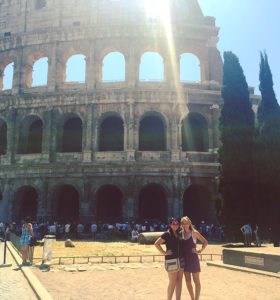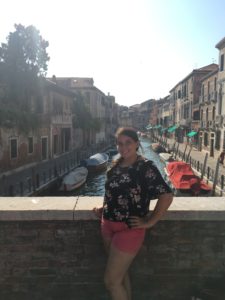I’ve just gotten back home from an absolutely wonderful week traveling through Italy! While it’s nice to have reliable internet connections and reasonable humidity forecasts, it was certainly a bittersweet goodbye as I already miss the country I have grown to feel a part of. While talking about Italy’s performance in the last game of the Euro Cup, I found myself using the word “noi” which means we in Italian to discuss the team. I didn’t realize it until my Italian friend pointed it out, and I was a little embarrassed at first considering that I was including myself in a group of people I technically didn’t belong to, but he was quick to tell me that it was heartwarming to him that I consider myself such a part of Italy, and that I should continue to use “noi” when discussing Italy. It was one of the many little exchanges I had with native Italians that really made me feel like I was leaving a new home. It was very difficult to leave Sorrento especially knowing how far away it is from the US, but I hope that I can return someday in the future and visit my host family and friends, hopefully fluent in Italian.
Over the next week I visited Rome (Roma), Florence (Firenze), Verona, and Venice (Venezia). Before traveling, I knew that Italy was very separated into its regions by dialect and overall culture. In Italian class back at Notre Dame, we would touch on these differences watching satirical youtube videos or listening to the professors tease each other based on where they are from in Italy. It was so interesting to be able to see those changes in such a fast pace as I traveled from the southwest coast to the northeast coast of Italy. Rome is the largest city of Italy, the capital of the nation, and the home of the Vatican City. This was my second time visiting Rome on this trip, and I was still in awe of the history around every corner. There is really a sense of greatness you feel when walking around the city as you pass the Roman Forum on the way to the Pantheon, stumbling upon the Trevi Fountain and the Colosseum along the way. There is a harmony between the ancient and the modern that I haven’t seen replicated anywhere else. The people of Rome are generally very nice, and seem relieved whenever I would speak Italian to them. I think that in the hustle and bustle of the day, speaking their native language gave them a bit of a breather from the communication barriers they have with the hundreds of thousands of visitors from all over the world. It was a pleasure to return to my favorite sites and restaurants, but also to explore new areas. We went to the Vatican City to see St. Peter’s Basilica and the Vatican Museums. It was almost a game for my friend and I to ask questions in Italian to the guides and people working to see what I could pick up and if they would notice that I’m not a native speaker.
We took a quick trip to Florence just for the day to see the David and the Duomo. Florence was absolutely beautiful, and I really regret not spending more time there. The shop owners were so helpful to me because I struggled a bit more here than in Rome with my Italian, but they would try not to resort to English and instead rephrase the questions and statements to help me out. While there were still plenty of tourists, it was a refreshing escape from the “big city” atmosphere of Rome. I struck up a conversation with our waiter when we were having dinner, and he told me how he actually just bought the restaurant with a few of his friends and about how important it was to them because they grew up eating there, and by the end of the night they had given us free tiramisù! I’m sure that I wouldn’t have been able to have that opportunity had I not been speaking Italian.
Next, we visited Verona to see Carmen at the Arena Di Verona, a functioning ancient colosseum famous for its operas and concerts. Verona was by far my favorite part of Italy as it had a hometown kind of feeling. It wasn’t very touristy compared to the bigger cities, and by the second day we were there we had thrown out the map because we already felt like we knew the place. We stayed at a b&b owned by a young man named Matteo, and we had the opportunity to meet his 4 year old son as we checked in. He didn’t speak much English at all, so I could tell it was a big relief to speak Italian. He was impressed that I knew the language and even more impressed that I was able to keep up with him. He gave us dinner recommendations and gave us a few tips about going to the opera. He was extremely helpful and really made our experience in Verona that much better because we felt like we had a friend to help us if we needed it.
Finally, we went to Venice to top off the week. We had heard wonderful things about Venice from friends at home and at school, so we were eager to arrive. We stayed in Mestre on the mainland, and would take the bus into the Island in the morning and home at night. It was a nice system that saved us a ton of money in the long run. The Veneto dialect was a little hard to understand as it deviates the farthest from the Italian language taught in school. Most people would switch to Italian when they heard me speaking it, but a few of the waiters and shop owners weren’t able to speak Italian, so we just communicated in broken Veneto and Italian until we had an arrangement. It was like a little puzzle and it was fun to have more of a challenge. I didn’t realize how different Veneto is from Italian, and I’m glad that I was able to study in Sorrento where Italian is widely used on a daily basis, and I still got to learn a little bit of the Neapolitan dialect. While in Venice, we went to a concert in Stra on the mainland at Villa Pisani, one of the Villas owned by the government that used to be run by the wealthiest of Italy. It was truly grand and to see my favorite pianist and composer, Ludovico Einaudi, perform on the courtyard was a truly unforgettable experience. I think that my friend was the only attendant of the concert that didn’t speak Italian, because I didn’t hear a single word of English during my time there and that was rare. The signs were only in Italian, and the security men and guides wouldn’t offer any English. I could tell my friend was a little out of her comfort zone, but I was glad that I picked up on everything and was able to maneuver around the Villa to find the concert with the Italian instructions.
This last week of travel, while not technically a part of the SLA, was a true culmination and test of the Italian I learned in Sorrento. I really do feel more confident speaking Italian, and I find myself thinking in Italian some of the time. It has been really interesting to see the shift between learning a language as in school, and learning to become bilingual from being around native speakers. While I’m certainly not fluent, I think that I’ve really come a long way in being able to respond quickly in Italian and process what I’m hearing as though it were English. I can’t wait to finish the language sequence at Notre Dame, and hopefully return to Italy for a semester abroad next year and be able to confidently say that I am a fluent Italian speaker. I think that I have laid a good groundwork for fluency in Sorrento, and I’m really eager to continue my studies at Notre Dame.

